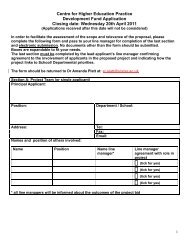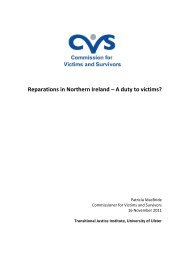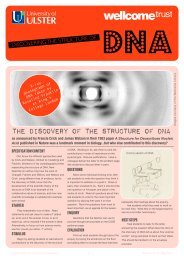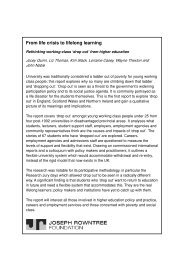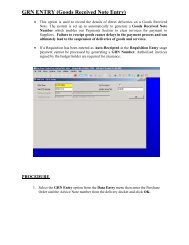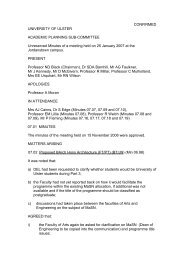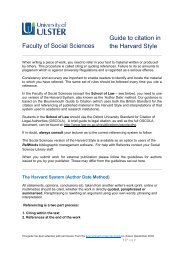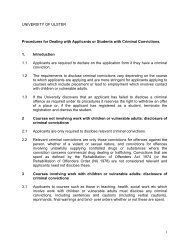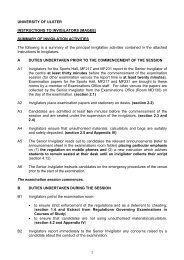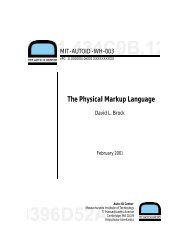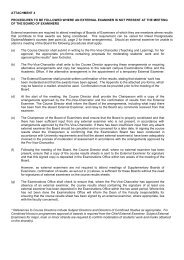Module Data Quality - University of Ulster
Module Data Quality - University of Ulster
Module Data Quality - University of Ulster
You also want an ePaper? Increase the reach of your titles
YUMPU automatically turns print PDFs into web optimized ePapers that Google loves.
UNIVERSITY OF ULSTER<br />
TEACHING AND LEARNING COMMITTEE<br />
16 June 2010<br />
MODULE DATA QUALITY ENHANCEMENT WORKING GROUP<br />
1. INTRODUCTION AND BACKGROUND<br />
During preparation <strong>of</strong> the 2008/09 statutory HESA return from the new Banner<br />
student records system, it became clear that there appeared to be a growing trend <strong>of</strong><br />
module non-completion, due in many instances to the available records showing that<br />
students were not sitting final module examinations or were not submitting<br />
coursework. This resulted in the 2009 HESA return showing a markedly higher noncompletion<br />
rate than before.<br />
As defined by HEFCE, completion does not refer to success or failure in a module<br />
but is determined by the fact that all assessments have been attempted. <strong>Data</strong> on<br />
whether or not students have completed all modules on which they are enrolled<br />
feeds directly into the <strong>University</strong>’s HESES and subsequent HESA returns and<br />
therefore instances <strong>of</strong> non-completion have a direct and potentially significant impact<br />
on an institution’s funding.<br />
To explore in some detail the common issues impacting on module data quality,<br />
including the quality <strong>of</strong> registration and assessment data held against modules and<br />
their potential impact upon student progression and retention data, a Working Group<br />
was established, under the Chairmanship <strong>of</strong> the PVC (Teaching and Learning).<br />
2. WORKING GROUP ACTIVITIES<br />
The Working Group met on three occasions between March and May 2010 under the<br />
remit to identify and consider issues that impact upon module quality and the quality<br />
<strong>of</strong> module data, and to bring forward recommendations that would enhance both <strong>of</strong><br />
these items such that their implementation would assist in improving student<br />
retention and progression whilst at the same time underpinning the robustness <strong>of</strong> the<br />
data required for statutory returns.<br />
The Department <strong>of</strong> Corporate Planning and Governance is responsible for making<br />
the student related statutory returns and, as such, is reliant on the data held in the<br />
Student Record System. The returns exercise is particularly difficult where there<br />
appears to be instances <strong>of</strong> insufficient or missing module assessment data for<br />
students.<br />
Given the potential for misinterpretation arising from the current arrangement, the<br />
Working Group focused its activities on identifying the scale and scope <strong>of</strong> the<br />
apparent insufficient/missing data problem and proposing corrective actions, in the<br />
form <strong>of</strong> recommendations.<br />
3. CONCLUSIONS<br />
Analysis <strong>of</strong> the missing module data by Faculty and Department representatives<br />
resulted in the identification <strong>of</strong> two broad categories <strong>of</strong> explanation: reasons relating<br />
to the programme and/or module (e.g. programmes with flexible frameworks,
dissertation and other modules that span more than one semester, exit awards, etc,)<br />
and reasons relating to an individual’s circumstances (e.g. leave <strong>of</strong> absence,<br />
extension, change <strong>of</strong> status, repeating a year, not taking modules signed up for,<br />
etc.).<br />
There is capacity within the statutory returns to allocate a code to modules with a<br />
non-standard structure, which would flag the fact that marks would not be expected<br />
until a later date. Identification and appropriate coding <strong>of</strong> such modules could<br />
address a proportion <strong>of</strong> the missing information.<br />
In conjunction with data associated with modules and completions, personal data is<br />
also required for statutory returns, for example details <strong>of</strong> students’ highest<br />
qualifications on entry to the institution. Representatives from Corporate Planning<br />
and Governance reported a correlation between students that enroll <strong>of</strong>f-line and<br />
instances <strong>of</strong> missing personal data<br />
The importance <strong>of</strong> data accuracy and the potential implications for <strong>University</strong>/Faculty<br />
funding is not clearly understood by all involved in the data input process. There is a<br />
need to raise awareness <strong>of</strong> both the range <strong>of</strong> Banner data output reports available to<br />
assist academic staff with module co-ordination/programme management and the<br />
ramifications <strong>of</strong> missing or inaccurate data being recorded.<br />
There appears to be evidence <strong>of</strong> established procedures not being fully followed in<br />
some Faculties and a variety <strong>of</strong> operational practices are in existence.<br />
A proportion <strong>of</strong> the data identified as missing could be captured through a<br />
combination <strong>of</strong> enhancements to the current data systems and processes and a<br />
range <strong>of</strong> communication measures to provide key information to stakeholders and to<br />
encourage more use <strong>of</strong> Banner validation reports at the Faculty/School level.<br />
4. PLANNED ENHANCEMENTS<br />
Student Administration introduced a range <strong>of</strong> measures during the 2008/09 and<br />
2009/10 academic years to ensure the accuracy <strong>of</strong> module assessment data and<br />
plan to introduce the following additional measures in 2010/11 to further improve the<br />
quality <strong>of</strong> student data:<br />
a) Online Enrolment Confirm <strong>Module</strong> Selection screen to be enhanced for<br />
registration from 1 September 2010. Enhancements will include<br />
� Check if students on full-time undergraduate programmes have chosen more<br />
that 120 credits and prevent them from proceeding with enrolment until they<br />
have reduced the number <strong>of</strong> credits selected. Additional coding to take into<br />
account a number <strong>of</strong> course years where students are permitted to take more<br />
than 120 credits.<br />
� Where full-time undergraduate students, except students on a placement or<br />
intercalary year (attribute <strong>of</strong> SW or IC), fail to select modules amounting to at<br />
least 120 credits they will receive a warning message.<br />
2
) Additional suite <strong>of</strong> validation reports to identify potential anomalies in module<br />
enrolments for registered students other than full-time undergraduates, students<br />
on leave <strong>of</strong> absence and early leavers.<br />
5. RECOMMENDATIONS<br />
The following recommendations, in conjunction with the planned enhancements<br />
detailed above, will maximise capture <strong>of</strong> the module and personal data required for<br />
statutory returns.<br />
1<br />
2<br />
3<br />
4<br />
5<br />
Recommendation Responsibility Timescale<br />
Online Enrolment<br />
Online enrolment to be made compulsory for all<br />
new entrants and progressing students.<br />
<strong>Module</strong> Coding<br />
<strong>Module</strong>s<br />
a) that do not complete within the HESA<br />
reporting period (i.e. modules completed in<br />
the following academic year), and<br />
b) for which results will not be available within<br />
the HESA reporting period (i.e. results not<br />
known until after 30 September)<br />
to be identified and assigned an appropriate<br />
identification code to flag the expected<br />
completion date within statutory returns.<br />
Updating exercise to be undertaken on an<br />
annual basis.<br />
Communication/Training<br />
The Notes <strong>of</strong> Guidance (Leave <strong>of</strong> Absence,<br />
Withdrawals, Repeating Students, etc.),<br />
previously distributed by Student<br />
Administration, to be re-circulated to Faculties<br />
for dissemination and discussion at appropriate<br />
Faculty/School Course Director forums.<br />
Banner report summaries and Notes <strong>of</strong><br />
Guidance (Recommendation 3 refers) to be<br />
made available on the new Course Director<br />
Support Facility being developed for the Portal.<br />
Formal procedures to be established to<br />
manage within Faculties the validation <strong>of</strong><br />
assessment results, utilising reports currently<br />
provided by Student Administration and<br />
investigating issues identified by the new suite<br />
<strong>of</strong> validation reports (Section 4b refers).<br />
3<br />
Course Directors<br />
Corporate<br />
Planning &<br />
Governance<br />
Student<br />
Administration/<br />
Heads <strong>of</strong> School<br />
Student<br />
Administration<br />
Heads <strong>of</strong><br />
School/Faculty<br />
Administration<br />
2010/11<br />
Academic<br />
Year<br />
Aug/Sep<br />
2010<br />
Aug/Sep<br />
2010<br />
Pending<br />
availability<br />
<strong>of</strong> Portal<br />
Facility<br />
2010/11<br />
Academic<br />
Year
6<br />
7<br />
PMcC<br />
Recommendation Responsibility Timescale<br />
School staff to be encouraged to produce<br />
course results sheets for Course Directors.<br />
<strong>Data</strong> Integrity Internal Audit Review<br />
Implementation, progression and monitoring <strong>of</strong><br />
Recommendations 1-6 to be integrated into the<br />
outcomes <strong>of</strong> the KPMG Audit.<br />
4<br />
Heads <strong>of</strong><br />
School/Faculty<br />
Administration<br />
Corporate<br />
Planning &<br />
Governance<br />
2010/11<br />
Academic<br />
Year<br />
May/June<br />
2010



